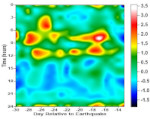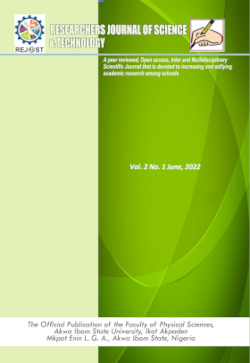Lithosphere-Atmosphere-Ionosphere Coupling Processes for Pre-, Co-, and Post Earthquakes: A case study of Northern Mariana, U.S.A. Earthquake of 31st October, 2007
Keywords:
Earthquake, DEMETER, TEC, Perturbations, SeismogenicAbstract
Using the Plasma analyzer (IAP)and Langmuir Probe (ISL) experiments of the (Detection of Electromagnetic Emissions Transmitted from Earthquake Regions (DEMETER) and Total Electron Content (TEC) from GPS data, lithospheric-atmospheric - ionospheric coupling has been observed before, during and after the magnitude 7.2 Northern Mariana, U.S.A. Earthquake of 31st October, 2007. Both sets of data recorded perturbations within the investigative period. The study revealed pre – ionospheric variations on -17 day in the TEC with a value of 3.57 Total electron content unit (TECU) at 8:00 UTC while the IAP and ISL (Electron density) sensors of the DEMETER had 2.83 cm3 and 3.95 cm3 respectively on - 4 days. All pre -ionospheric perturbations were recorded in the morning. A co - ionospheric perturbation was revealed by the Electron Density with a value of -2.04 cm3 during the night time reading on the earthquake day (day 0). Four post - seismic day perturbations were recorded on day 2 (2.35 K and day 3 (2.15 K) from Electron temperature of the ISL experiment and 2.18 cm3 and 3.98 cm3 on days 5 and 7 respectively from the IAP sensor. The observed anomalies were screened for false alarm using the geomagnetic indices of Kernnifzer digit (Kp) and disturbance storm time (Dst.) It was however realized that the state of the ionosphere was geomagnetically quiet on these days; hence the observed variations were seismogenic.
References
Akhoondzadeh, M., Parrot, M., Saradjian, M.R. (2010). Electron and ion density variations before strong earthquakes
(M>6.0) using DEMETER and GPS data. Nat. Hazards Earth Syst. Sci. 10, 7–18.
Berthelier, J.J., Godefroy, M., Leblanc, F., Seran, E., Peschard, D., Gilbert, P., Artru, J., (2006). IAP, the thermal
plasma analyzer on DEMETER. Planet. Space Sci. 54, 487– 501.
Bommer, J.J., Crowley, H., Pinho, R., (2015). A risk-mitigation approach to the management of induced seismicity. J.
Seismolog. 19 (2), 623–646.
Calais, E., Minster, J.B., 1995. GPS detection of ionospheric perturbations following the January 17, 1994, Northridge
earthquake. Geophys. Res. Lett. 22, 1045– 1048.
Celebi, M., Page, R.A., Seekins, L. (2012). Building Safer Structures (USGS Earthquake Hazards Program). Retrieved
from http://earthquake.usgs.gov/learn/publication /saferstructure/.
Chmyrev, V., Smith, A., Kataria, D., Nestor, B., Owen, C., (2013). Detection and monitoring of earthquake precursor.
Twinsat, A Russia – UK satellite project. Adv. Space Res. 52 (6), 1135–1145.
Davies, R., Foulgera, G., Bindleya, A., Styles, P., (2013). Induced seismicity and hydraulic fracturing for the recovery
of hydrocarbons. Mar. Pet. Geol. 45, 171– 185.
Dobrovolsky, I.R., Zubkov, S.I., Myachkin, V.I., (1979). Estimation of the size of earthquake preparation zones. Pure
Appl. Geophys. 117, 1025–1044.
Francesco M., Bizzarri, A., (2014). Anthropogenic triggering of large earthquakes. Scientific Reports 4, Article number: 6100. 10.1038/srep06100
Gupta, H.K., (1983). Induced seismicity hazard mitigation through water level manipulation at Kryna India: a
suggestion. Bull. Seismolog. Soc. Am. 73, 679– 682.
Hayakawa, M., Molchanov, O.A., (2002). Seismo- Electromagnetics:LithosphereAtmosphere-Ionosphere
Coupling. Terra Scientific Publishing Company, Tokyo, Tokyo.
Ibanga, J. I., Akpan, A. E., George, N. J.,Ekanem, A. M. and George, A. M.(2017), Unusual ionospheric variations
before the strong Auckland Islands, New Zealand earthquake of 30th September, 2007, NRIAG, Journal of Astronomy
and Geophysics, 7, 149-154, https://doi.org/10.1016/j.nrjag.2017.12.007.
Kamogawa, M., (2006). Pre-seismic lithosphere-atmosphere–ionosphere coupling. EOS Trans. Am. Geophys.
Union 87 (40), 417–424.
Klose, C.D., (2013). Mechanical and Statistical evidence of the causality of humanmade mass shifts on the Earth’s
upper crust and the occurrence of earthquakes. J. Seismolog. 17 (1), 109–135.
Lebreton, J. P., Stverak, S., Travnicek, P., Maksimovic, M., Klinge, D., Merikallio, S., Lagoutte, D., Poirier, B., Kozacek,
Z., and Salaquarda, M. (2006): The ISL Langmuir Probe experiment and its data processing onboard DEMETER:
scientific objectives, description and first results, Planet. Space Sci., 54(5), 472–486.
Liu, J.Y., Chuo, Y.J., Pulinets, S.A., Tsai, H.F., Zeng, X., (2002). A study on the TEC perturbations prior to the Rei-Li.
In:Mayaud, P.N., (1980). Derivation, Meaning and use of geomagnetic indices, Geophysical Monograph 22.
American Geological Union, Washington DC. McGarr, A., (2014). Maximum magnitude earthquakes induced by fluid injection. J. Geophys. Res. Solid Earth 119 (2), 1008–1019
Ondoh, T., (2008). Investigation of precursory phenomena in the ionosphere, atmosphere and groundwater before
large earthquakes of M >6.5. Adv. Space Res. vol. 43, pp. 214–223.
Parrot, M., (2012). Statistical analysis of automatically detected ion density variations recorded by DEMETER and
their relation to seismic activity. Ann. Geophys. 55 (1), 149–155.
Píša, D., Parrot, M., Santolík, O. (2011). Ionospheric density variations recorded before the 2010 Mw 8.8 earthquake in
Chile. J. Geophys. Res. vol. 116, A08309. 10.1029/2011JA016611
Pulinets, S.A., Boyarchuk, K.A., (2004). Ionospheric Precursors of Earthquakes. Springer, Verlag Publishers. Germany,
Berlin.Rapoport, Y., Grimalsky, V., Hayakawa, M., (2004). Change of ionosphere plasma parameters under the influence of electric field which has lithospheric origin and due to radon emanation. Phys. Chem. Earth. 29, 579–587.
Rong, Z., Feng, J. and Xin-yan, O. (2008): Ionospheric perturbations before Pu’er earthquake observed on DEMETER.
Acta Seismologica Sinica, 21(1), 77 -81.
Rozhnoi, A., Solovieva, M., Molchanov, O., Schwingenschuh, K., Boudjada, M., Biagi, P.F., Maggipinto, T., Castellana, L., Ermini, A., Hayakawa, M., (2009). Anomalies in VLF radio signals prior the Abruzzo earthquake (M = 6.3) on 6
April 2009. Nat. Hazards Earth Syst. Sci. 9, 1727–1732.
Sunil, A.S., Bagiya, M.S., Reddy, C.D., Kumar, M., Durbha Sai Ramesh, D.S., (2015). Postseismic ionospheric
response to the 11 April 2012 East Indian Ocean doublet earthquake. Earth Planets Space 67, 37.
https://doi.org/10.1186/s40623-015-0200-8.
Thomas, J. E., Ekanem, A. M. George, N. J and Akpan, A. E. (2021): Electron Temperature and Ion density
perturbations prior to the M6.8 Eastern Honshu, Japan earthquake of July 23, 2008. Journal of Earth System Sciences
https://doi.org/10.1007/s12040-021-01645-8.
Thomas, J. E., George, N. J., Ekanem, A. M.,Nathaniel, E. U., (2020). Preliminary investigation of earth tremors using total
electron content: a case study in parts of Nigeria., NRIAG Journal of Astronomy and Geophysics, 9:1, 220-225, DOI:
1080/20909977.2020.1723866
Verdugo, R., Gonzalez, J., (2015). Liquefaction- induced ground damages during the 2010 Chile earthquake.
ScienceDirect. 79, 280–295.
Zaslavski, Y., Parrot, M., Blanc, E., (1998). Analysis of TEC measurements above active seismic regions. Phys. Earth
Planet. In. 105, 219–228.

Downloads
Published
How to Cite
Issue
Section
Categories
License

This work is licensed under a Creative Commons Attribution-NonCommercial-NoDerivatives 4.0 International License.




